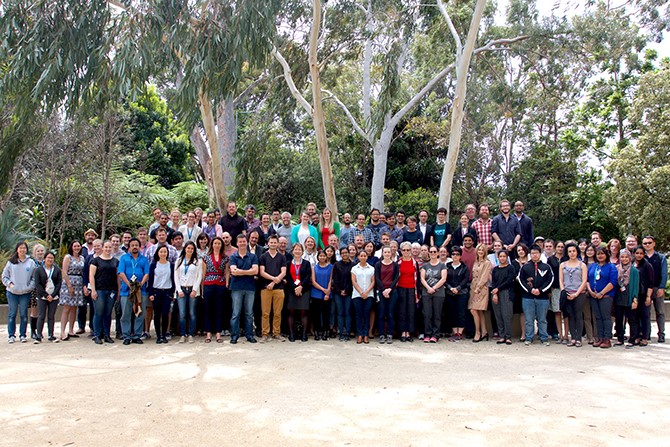Spotlight on the Department of Microbiology, Monash University
2 August 2021
The Department of Microbiology is a leading research and teaching department, covering various aspects of bacteriology, virology and parasitology. The department has approximately 150 staff, which include 15 research groups and a number of NHMRC and ARC research fellows (including an ARC Laureate Fellow and NHMRC clinical fellow), a Fellow of the Australian Academy of Science and numerous adjunct fellows located in partner research institutes focussed on infection and host response. Prof Stephen Turner is the new Head of Department.
The Department of Microbiology is also a member of the Monash Biomedical Discovery Institute, as one of six departments in the School of Biomedical Sciences. The BDI comprises six inter-disciplinary health-focused research Programs, each led by a research leader in the field. The largest of these programs is the Infection and Immunity theme, of which the department is a major stake holder and contributor. The BDI works closely with clinical and drug development precincts at Monash and has a number of major industry partnerships to facilitate the translation of our research.
Teaching:
In our teaching activities, we teach undergraduate students at a variety of levels in a broad range of courses, but most of our students are undertaking degrees in Biomedical Science, Science or Medicine. We deliver majors in Microbiology, including virology. We have an extensive Honours program, as well as contributing to coursework units for the Masters of Biomedicine that examines infectious disease. A vigorous postgraduate program is supported, with more than 50 PhD students currently enrolled.
We pride ourselves on an excellent and evolving teaching curriculum and our teaching space is about to be transformed by a new $80 million biomedical teaching building. Opening in 2019, the new building will provide world-class teaching and learning space for Biomedical Sciences.
Research Strengths:
Research within the department aims to understand how various microorganisms interact with their human or animal hosts at the molecular level, how that interaction can result in disease, and how this can be prevented. We have particular research strengths in the areas of identifying novel molecular and cellular factors that drive pathogenesis for a variety of microorganisms, and how these can contribute to host disease and pathogen transmission. We are also world-leaders in the molecular basis of antimicrobial resistance, how this evolves and the impact on clinical outcomes of infection. We have active programs in development of new antimicrobial strategies and drug discovery; identification of molecular mechanisms that enable pathogens evade host immune responses and of host factors that contribute to development of effective pathogen immunity; and the development of novel immune therapeutic strategies, such as vaccines.
Researchers use an array of cutting edge technologies to address these research questions. This includes cutting edge approaches such as structural biology, cyroEM, atomic force microscopy, dSTORM and confocal microscopy, bacterial and virology genomics/evolutionary biology, computational biology, and extensive in vivo pathogen challenge models, and systems biology approaches for proteomics and metabolomics. The Department has extensive clinical links with hospital infectious disease departments (e.g. Alfred and Monash Hospitals) in Melbourne enabling us to address important clinical problems caused by nosocomial infection. The Department also has a number of important partnerships with research institutes within Melbourne including VIIN contributing organisations, Hudson Institute for Medical Research and the Burnet Institute. We also have numerous international linkages with research centres that include the Wellcome Trust Sanger Institute for pathogen genomics, UK; Newcastle University, UK; Cardiff University, Wales; The Pasteur Institute, France; and Wenzhou University, China.
Industry Engagement:
The department has strong partnerships with industry that includes recent collaborative projects that aim to advance research discovery into commercial or clinical applications. A key linkage partner is CSIRO, with whom we are studying the use of bacterial enzymes to catalyse chemical production at an industrial scale. Another example is the development of a novel therapeutic for Clostridial disease and the use of novel infrared spectrometry for diagnosis of malarial infection and sepsis; as well as the development of novel compounds for use as antimicrobial therapies.
Further details about the department can be found at: www.med.monash.edu.au/microbiology/

Members of the Department of Microbiology, Biomedical Discovery Institute, Monash University; Dec 2016. Photo credit: Mr Daniel Fox (PhD student, Micro Dept).
The Department's history in VIIN
In 2004, the Department of Microbiology was a founding partner in the Monash Infection and Immunity Network. Led by Prof Ben Adler of the Department of Microbiology and Prof Paul Hertzog, of the then Monash Institute of Medical Research, the Monash Infection and Immunity Network, became a state-wide network in 2009. When Prof Adler stepped down from the VIIN committee, Prof Dena Lyras became the Department's representative on the VIIN committee. Dena now hands that role to Dr Greg Moseley.

